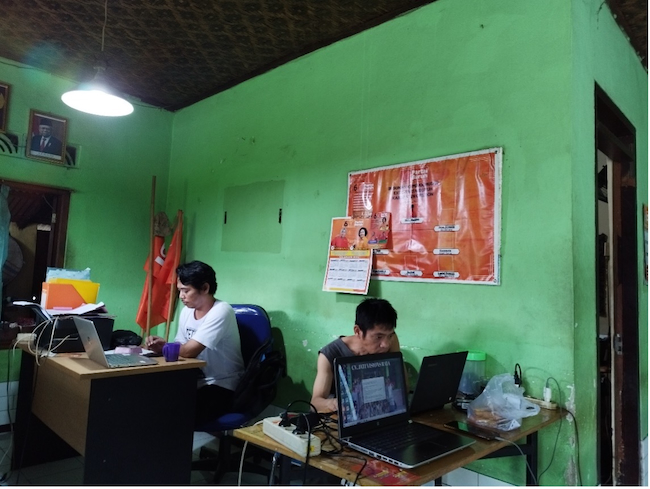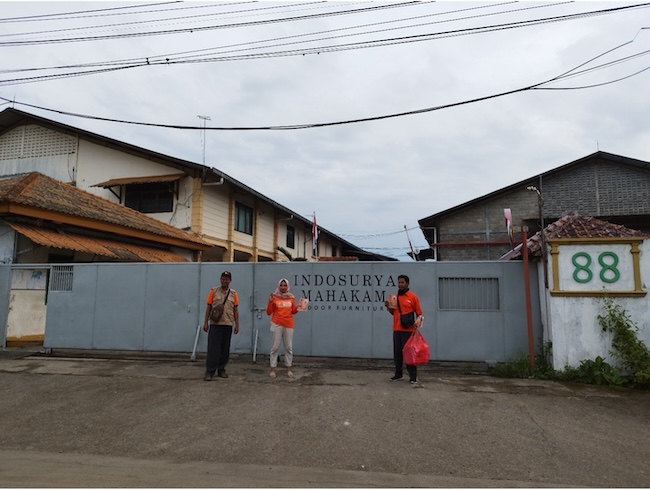The Labour Party (Partai Buruh) was revived in the wake of opposition to the Omnibus Law on Job Creation, but failure in the 2024 election shows they failed to connect with the workers they aim to represent
Hasna A. Fadhilah
‘There's no sign here at all, Mbak,’ cautioned the Gojek driver as we arrived at the designated location. Despite our search, there was no conspicuous flag or office building to indicate the presence of the Labour Party (Partai Buruh) headquarters. After double-checking the map and feeling perplexed, I made the decision to backtrack two hundred metres from the pinpointed location, and hopefully stumble upon the elusive party office. Before long, a small orange flag adorned with the symbol of a paddy plant caught my eye in front of a modest house, bringing a wave of relief. Summoning my courage, I approached the door and announced my arrival, eager to signal to my hosts that a guest was awaiting entrance.
A friendly individual greeted me with a cigarette in hand. Introducing myself as a PhD student conducting fieldwork, I explained that I had arranged an interview with the party coordinator for the afternoon. While awaiting the coordinator's arrival, the cigarette-smoking gentleman invited me to join a discussion with other party members. Taking stock, I noted four men engaged in lively conversation about their party's agenda. Extending warm greetings to each of them, I resolved to glean as much data as possible from our interaction.
Amidst the cosy ambience, with cigarettes between their fingers and coffee cups perched atop an old table, the members shared their stories. They revealed that this election marked their inaugural foray into political competition, having previously been involved solely at the local and company levels through labour unions. Their discontent was palpable as they recounted the government's implementation of the Omnibus Law on Job Creation (UU 11/2020). Despite protests led by labour union representatives elected to parliament, their efforts were thwarted by a legislative body dominated by businessmen, as one of the party members, Mahmud (a pseudonym), explained in detail.

The Omnibus Law, initially intended to boost investment in Indonesia, has turned into a nightmare for workers. Prior to its enactment, many companies had assured their contract employees of permanent positions, only to renege on their promises once the law was passed. Even permanent employees were suddenly laid off and replaced by unpaid interns, while those on temporary contracts found themselves marginalised in favor of cheaper labour.
Seeking a political response
The implementation of the Omnibus Law exacerbated an already dire situation for Indonesia’s workers. Faced with these challenges, they could no longer afford to remain politically passive. While some had previously been involved in local labor unions and even had a representative in parliament, they found that this representation was insufficient. They experienced firsthand how the voices of minorities are often disregarded, as parliament, dominated by corporations, pushed for the swift enactment of the Omnibus Law. Upon discovering that the national labour union had reinvigorated the Labour Party to confront the Omnibus Law and advocate for better working conditions, these men made the decision to actively engage in the political arena.
‘But it will be a tough battle with money politics and all. Do you still believe that the constituents will trust you?’ I asked them with great curiosity. One of them took a deep breath, while others chose to puff on their cigarettes before responding to my question. Mahmud answered my question with a wise tone, acknowledging that it wouldn't be easy, but they were not willing to give up. They were aware that they refrained from resorting to money politics or seeking endorsements from religious figures, unlike many other politicians. Instead, they believed in their own approach, which attracted loyalists from the working class - farmers, factory workers, teachers, and more. Instead of employing the traditional methods of money or religious politics, they preferred to engage with representatives of each profession to understand their needs better.
This meant that the party’s finances were severely lacking. All campaign fees were sourced from former workers who contributed Rp1000 (US$0.06) per month to support the Labour Party’s work. With limited resources, they ensured that every penny collected from workers was utilised effectively, primarily for printing banners and posters. Some volunteers engaged in door-to-door campaigning, distributing stickers and pamphlets to introduce their political agenda and promises.
When constituents asked for money, they simply offered a smile, emphasising that such practices should not continue. While they were aware that other politicians offered cash to secure votes, the Labour Party remained committed to their idealistic approach, considering it a long struggle to educate Indonesian voters. Shortly after our discussion, I was invited to join them in distributing political pamphlets and flyers to labourers working for a nearby company. Clad in worn, orange party shirts, we eagerly awaited the workers who had just finished their afternoon shift.
As the workers emerged from the company gates, they wearily accepted our offerings, their exhaustion palpable. None seemed to spare a glance at the pamphlets' contents, too drained to notice. Some of them took the material but, after a few blocks, discarded them carelessly. A bystander jeered, ‘Just pamphlets? Where's the money?’

Similar scenes unfolded when members of the party canvassed door-to-door. Residents questioned why they hadn't brought gifts like rice, sugar, or other basic groceries. Some labour party members responded jokingly, claiming they were too impoverished to provide such items but pledged to deliver them once elected.
As the party members concluded their extensive campaigning efforts and left the neighbourhood, they were met with negative reactions from constituents. Some scoffed, questioning how they could dare to run for election when they couldn't enrich themselves. Such responses vividly illustrate the dominance of money politics in Indonesian elections.
This was in contrast with the public's reaction to the proposal of the Omnibus Law by the parliament in 2020. At that time, thousands of people took to the streets in protest, expressing massive opposition to the law. These protests occurred in numerous cities across the archipelago and involved a diverse range of participants, including workers, students, activists, and members of civil society organisations.
Given the public outcry against the Omnibus Law, many members of the Labour Party believed that their stance against the law would garner support from constituents. They were confident that their policy positions would sway voters away from parties supporting the Omnibus Law, thus benefiting their party. Their expectations were dashed when they experienced a heavy loss in the 2024 legislative election, registering just 0.64 per cent of the national vote, woefully below the four per cent threshold required to take up a position in the parliament. Even in industrial regions where they anticipated strong support, they failed to secure many votes. So, what caused Labour to fail miserably despite having programs that favoured the majority of the working class in Indonesia?
Strategic failings
Indonesian voters have become conditioned to expect money politics. Idealistic programs with long-term visions are still not on voters' radar. Reflecting on personal experiences, one respondent mentioned feeling tired of empty promises, making it seem rational to accept money from politicians rather than receiving nothing at all. Moreover, as the election approached, high inflation further impacted livelihoods. While many agreed with most of the Labour Party's programs, immediate financial relief took precedence for their households.
Another factor that Labour needs to improve upon is its political strategy. The party lacks a prominent figure who can serve as a strong symbol. Indonesians still believe that a strong leader is necessary for creating a peaceful and stable country, yet the Labour Party has not yet produced such a figure. Additionally, they have not effectively utilised social media platforms like TikTok and Instagram to appeal to the Gen Z demographic, that is likely to be affected by the Omnibus Law. Despite budget constraints and ineffective strategies, the party still performed better than other new parties, such as Partai Ummat and Garuda. They even secured many votes from Jakartans and the Indonesian diaspora abroad, indicating potential for expanding their constituents.
One respondent summed up her impression of the Labour Party by saying, ‘I believe that if all of the Labour Party's programs were implemented, our household would be better off. Currently, I haven't received a permanent contract from my company. I even heard that I could be replaced by younger employees when I turn 30 next year. But for now, I cannot vote for them. Another party offered me a pack of rice and some other basic needs that will help us survive for at least a month.’
Observing the actions of the Labour Party members and reflecting on the election results made me realise that political education for Indonesians still had a long way to go. While the working class had begun to explore new paths in engaging in elections, political awareness among voters remains weak. Most rational voters, especially those from lower classes, preferred short-term solutions over long-term promises they doubted would materialise. With such disappointing results in the 2024 elections, it remains to be seen if the Labour Party members would persist with this idealistic political approach and how they would seek to improve their political strategies to attract more voters next time around.
Hasna Azmi Fadhilah (h.a.fadhilah@uva.nl) is a PhD student currently conducting research in political anthropology at the Universiteit van Amsterdam. Prior to embarking on her PhD journey, she taught undergraduate classes at Institut Pemerintahan Dalam Negeri and Universitas Terbuka in Indonesia.











